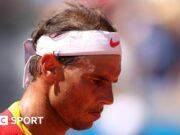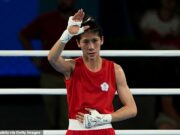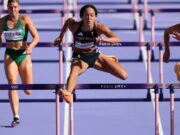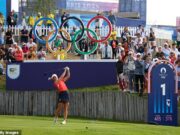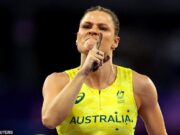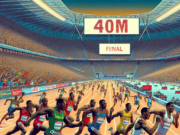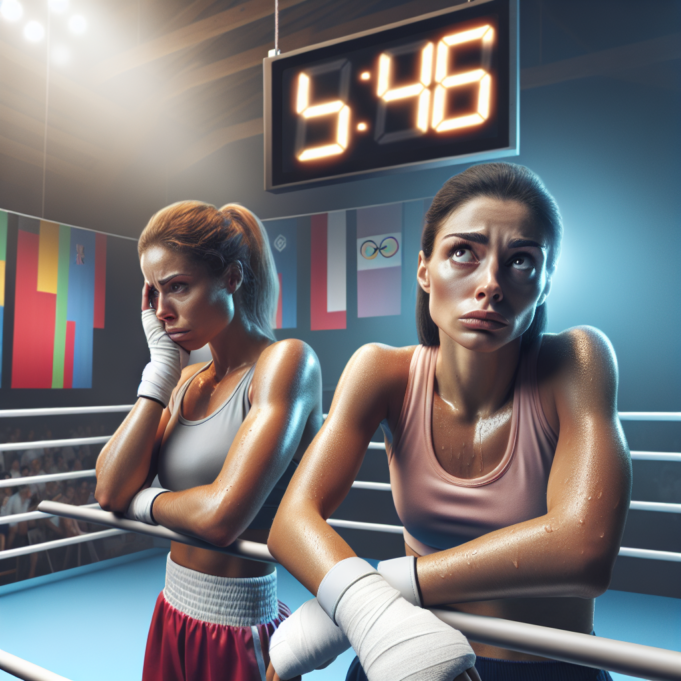Italian boxer Angela Carini was emotionally devastated after she withdrew from her match against Algerian Imane Khelif just 46 seconds into the bout, an event that triggered significant controversy at the Olympics.
Khelif is one of two boxers allowed to compete in the Olympics despite being disqualified from last year’s women’s world championships due to failing gender eligibility tests.
In a highly charged atmosphere at the North Paris Arena, Khelif’s first punch knocked Carini’s chinstrap loose, and a subsequent blow struck her chin, staining her shorts with blood. Following a series of punches, Carini returned to her corner, raised her hand, and fell to her knees in tears, refusing to shake Khelif’s hand as the Algerian was announced the victor.
Carini expressed that she decided to withdraw after experiencing a blow stronger than anything she had ever felt, fearing her nose might be broken. “I am heartbroken,” Carini stated. “I entered the ring to honor my father. Though I have often been called a warrior, I prioritized my health. I’ve never encountered a punch like this.”
The 25-year-old from Naples added, “I stepped into the ring to compete. I didn’t give up, but one punch was too painful, so I called it quits. I’m leaving with my head held high.”
“After the second punch and with my years of experience, I felt an intense pain in my nose. I decided to stop because I couldn’t continue after that. It was better to end the fight.”
“I’m devastated because I’m a fighter. I’ve been trained to be a warrior and have always conducted myself with honor, representing my country faithfully. Unfortunately, I couldn’t do that this time because I was unable to fight anymore. My opponent was secondary to my desire to win; I wanted the chance to battle.”
When asked if it would have been wiser to withdraw beforehand, Carini remarked, “I am not someone who surrenders easily. No, even if they had declared we wouldn’t be fighting, I would never have accepted that. I hold a warrior’s mindset. This time, pain overwhelmed me. I knew I had to stop.”
“This isn’t a defeat for me; entering the ring is a victory in itself, no matter the outcome. I’m not here to judge what’s fair or unfair. I simply did my job and left with confidence. I’m an adult, and when I recognize I can’t proceed, it isn’t a capitulation; it’s dignity in admitting when to stop. I was convinced I would win, I felt focused and calm. But after those punches to my nose, I decided to stop.”
Angela Carini leaves the ring after withdrawing from the bout. Photograph: Mohd Rasfan/AFP/Getty Images
Carini noted that it was “not for me to decide” whether Khelif should have been barred from competing. “I did my part.”
Khelif took a moment to converse with the BBC, stating: “I am here for gold. I will face anyone; I’m ready to fight them all.”
Reem Alsalem, the UN special rapporteur on violence against women and girls, shared her concerns over the incident, stating, “Angela Carini wisely prioritized her safety, but she and other female athletes should not be subjected to this kind of physical and psychological violence because of their gender,” she tweeted.
Italian Prime Minister Giorgia Meloni expressed her thoughts, saying, “I believe that athletes with male genetic traits should not be allowed in women’s competitions… it wasn’t a fair contest from my perspective.”
Prior to the match, the International Olympic Committee (IOC) faced criticism for allowing Khelif and Taiwan’s Lin Yu-ting to compete in the women’s category at these Games. Lin is scheduled to battle Uzbekistan’s Sitora Turdibekova in a featherweight fight on Friday.
after newsletter promotion
Last year, both boxers were disqualified from the world championships, with the International Boxing Association (IBA) president, Umar Kremlev, stating that DNA testing confirmed they had “XY chromosomes, thus resulting in their exclusion.” XY refers to the male chromosome combination, while XX is the female combination.
However, last night the IOC released a statement confirming that both boxers had “met” the entry regulations and “have been competing in international boxing competitions in the women’s category for many years.”
“In line with previous Olympic boxing events, the athlete’s gender and age are determined by their passport,” it added.
The IOC also criticized the IBA for modifying its gender rules mid-2023 during the world championships. “The current scrutiny toward these two athletes is based solely on this arbitrary decision taken without any proper process, especially considering these athletes had been competing successfully for years,” it stated. “Such practices violate good governance.”
Angela Carini on her knees in the center of the ring. ‘I entered the ring to honor my father. They called me a warrior many times, but I chose to stop for my health,’ she remarked. Photograph: John Locher/AP
Nonetheless, there are rising concerns among the boxing community and sports world. Australia’s boxing captain Caitlin Parker expressed apprehension regarding a teammate fighting in the same 66kg weight category as Khelif, stating, “I disagree with their presence in competitive sports, especially in combat sports. It can be incredibly perilous.”
Agence France-Presse reported that Khelif asserted she had been subjected to a “huge conspiracy” following her disqualification right before the final at last year’s world championships.
On Wednesday, the Algerian Olympic Committee (COA) condemned the “unethical targeting” and “baseless propaganda” against their distinguished athlete, Imane Khelif, from certain foreign media, adding, “Such detrimental assaults on her character and dignity are outrageously unjust, especially as she prepares for the high point of her career at the Olympics. The COA is taking the necessary steps to safeguard our champion.”
Hungarian boxer Luca Anna Hamori, set to face Khelif in the following round, stated she is ready. “I will step into the ring and aim for my victory. I have confidence in my coaches and in myself.”







